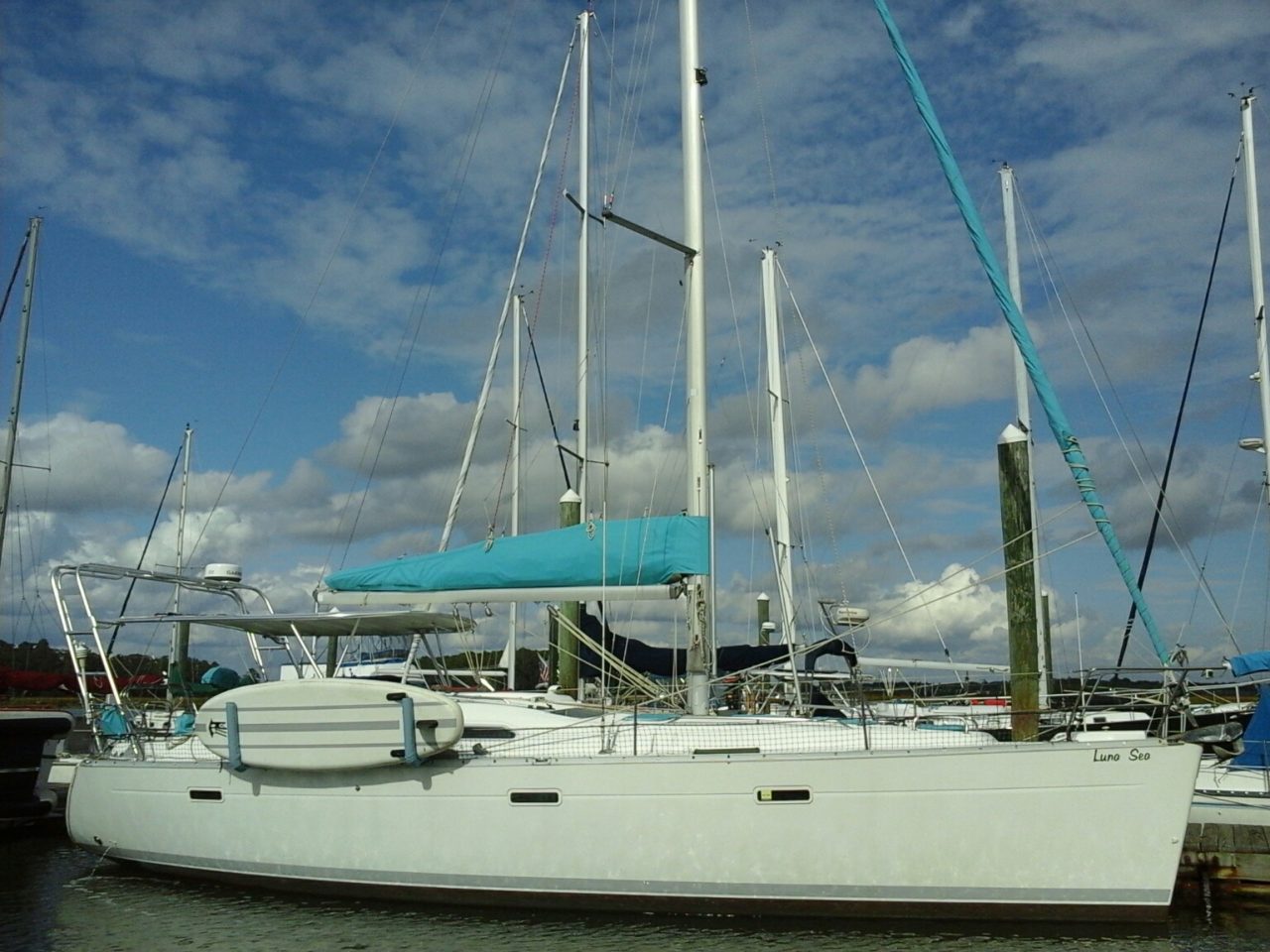Yep, there’s been water in the bilge. Actually – we’ve had water in the bilge since right after we bought the boat.
Wait – back up. What’s a bilge, you say? You know how a boat is shaped like a V on the bottom? Well, water that gets into the boat (or comes out of the boat) goes into the bottom of boat, under the floor boards. Then, if it reaches the top of the automatic bilge pump, the bilge pump (it’s a pump that pumps out the water automatically)comes on and removes that water from the boat. We don’t have a particularly deep bilge area – which means it wouldn’t take a ton of water to make the bilge pump kick on. But it never has come on, to our knowledge. We’ve turned on the switch and pumped out a wee bit of water here and there, but we’d previously deduced that the water that was accumulating was from the AC condensation run off and while not ideal, it was not going to sink Luna Sea.
For provisioning purposes, I’ve been spending some time getting to know those cubby holes under the floor boards (all of which have drain holes that lead to the bilge/bilge pump) and noticed a larger than normal amount of water under the floors. This was particularly odd as we’ve not been running the AC. It’s cold here!
Huh. I feel like I need to explain more. So, when the water all drains to the center of the boat, it should fill up that deepest area and then kick on the bilge pump. Therefore, water in the cubby holes under the floor should be backing up from that central location – ie overflow water. That means if I lift the floor board under the companionway/in front of the aft head and there’s water (in this overflow area) then all of the compartments between that overflow area and the bilge should have water in them. They didn’t. Mark was not on the boat when I made this discovery. I mopped/sponged up the water and checked for a source. It was right in front of the aft head, so I grabbed my flashlight and looked for dripping water. Nothing. I checked the AC seacock in the next cubby hole and it was not dripping. I kept searching and tracing and found nothing. I dried up the bit of water one more time and then hit the road.
The next day, we headed over and Mark got to work. He basically came to the same conclusions as me – but he actually thought to turn on the water pump. (we have a water pump that pressurizes the water lines, just like in a house) Here’s what he eventually found:
Yep. That is water. Water spurting non-stop under the sink in the aft head. Turns out, anytime there’s pressure in the water lines, this was going on. Not ideal, but still not going to flood the boat.
How did Crafty Man deduce this? First step was to look at the water and tell me to taste it. Yeah. I’m not tasting the water. Sure, the water in the cubby hole doesn’t look as dirty as the river water we’re sitting in, but underneath the floors is by no means the cleanest part of our boat.
 |
| The mystery puddle. Would you taste water from here? |
But he did it. He tasted the water and it wasn’t salty. Good news – water was not coming from outside the boat. Then he just followed the same steps I did – only he turned on the water pump. Brilliant.
Because the leak was just above the hose clamp, he was able to cut the damaged portion of the hose off and reattach the hose clamp. Easy peasy. (I can say this, as I was not involved in the work)
To be honest, we noticed the water pump kicking on a few times recently when the water was not running. That was a clue – but we had not noticed the water accumulation, so we were slack.
The mystery has now been solved. And while I’d like to think this was contributing to our over-use of water, Mark assures me that this is not shooting out serious amounts of water. We are, in fact, still water hogs.
Off to clean the boat – including those gross sub floor storage spaces!






Listening for that water pump is key!! We heard ours going off while watching a movie late at night and it turns out our aft head sink was running water. "Someone" forgot to turn the water off, and instead just had the valve shut off on the nozzle but it was still dripping a little. Glad you got it figured out!!
-Jody
S/V Mary Christine
http://www.wherethecoconutsgrow.com
Listening for that water pump is key!! We heard ours going off while watching a movie late at night and it turns out our aft head sink was running water. "Someone" forgot to turn the water off, and instead just had the valve shut off on the nozzle but it was still dripping a little. Glad you got it figured out!!
-Jody
S/V Mary Christine
http://www.wherethecoconutsgrow.com
Yes, I think we will certainly pay more attention to any random water pump action!
Yes, I think we will certainly pay more attention to any random water pump action!
Great catch on your part!
I love that Mark asked YOU to taste the water first.
I would suggest you add a high water alarm in your bilge (if you do not already have one). They are very inexpensive. The float switches used to kick on the bilge pumps are notoriously unreliable. In the event the float switch fails, you will then get an alarm. A few dollars for great peace of mind.
Mark and Cindy
s/v Cream Puff
http://www.creampuff.us
Great catch on your part!
I love that Mark asked YOU to taste the water first.
I would suggest you add a high water alarm in your bilge (if you do not already have one). They are very inexpensive. The float switches used to kick on the bilge pumps are notoriously unreliable. In the event the float switch fails, you will then get an alarm. A few dollars for great peace of mind.
Mark and Cindy
s/v Cream Puff
http://www.creampuff.us
Way to go super sleuths!
Way to go super sleuths!